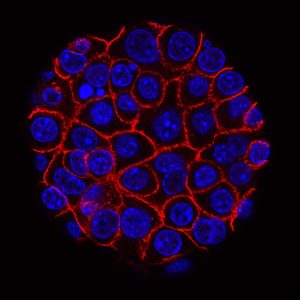
Forxiga accepted for use within NHS Scotland for chronic heart failure
pharmafile | April 14, 2021 | News story | Research and Development | AstraZeneca, nhs scotland
AstraZeneca have announced that Forxiga (dapagliflozin) has been accepted for use within NHS Scotland by the Scottish Medicines Consortium (SMC) as an additional option for the treatment of symptomatic chronic heart failure (HF) with reduced ejection fraction (rEF) in adults, as an add-on to already optimised standard care.
Dapagliflozin is in a class of medicines called SGLT2-inhibitors and is the first medicine of this kind to be recommended for use in adults with symptomatic chronic HFrEF in Scotland.
The acceptance by the SMC was based on the positive results from the DAPA-HF Phase III clinical trial which showed that dapagliflozin, on top of standard of care, reduced the risk of the composite endpoint of cardiovascular death, unplanned hospitalization, or an urgent visit to hospital requiring IV therapy for HF by 26%, when compared to placebo on top of standard care.
Tom Keith-Roach, President of AstraZeneca UK, said: “We are thrilled with the SMC’s decision, which provides access to an additional treatment [option] for people living with [symptomatic chronic] heart failure [with reduced ejection fraction].
“Now more than ever, it is vital that we find ways to reduce the strain on our health services. We are committed to collaborating with our NHS partners to eradicate unplanned admissions for heart failure in the UK and implement innovative approaches that help people live a better quality of life and stay out of hospital.”
HF is a life-threatening chronic condition, where a person’s heart is unable pump enough blood around their body. An estimated 46,000 people are living with HF in Scotland and the risk of death over five years associated with HF is worse than some of the most common cancers, such as prostate, bladder, colorectal, and breast cancer.
John McMurray, MD, Cardiovascular Research Centre, Institute of Cardiovascular and Medical Sciences, University of Glasgow, said: “Today’s announcement is great news for people in Scotland living with [chronic] heart failure and a reduced ejection fraction.
“This decision means there will be a novel treatment option available that can make a difference to their lives, by improving symptoms, reducing their risk for hospitalisation for heart failure and cardiovascular death in this life-restricting and life-threatening condition.”
Kat Jenkins
Related Content

AstraZeneca shares results for Imfinzi in phase 3 trial for small cell lung cancer
AstraZeneca has announced positive high-level results from the phase 3 ADRIATIC trial, which demonstrated that …

FDA accepts BLA for AstraZeneca and Daiichi Sankyo’s datopotamab deruxtecan for breast cancer treatment
AstraZeneca and Daiichi Sankyo have announced that their Biologics License Application (BLA) for datopotamab deruxtecan …

FDA approves AstraZeneca’s Ultomiris for NMOSD treatment
AstraZeneca has announced that the US Food and Drug Administration (FDA) has approved Ultomiris (ravulizumab-cwvs) …








